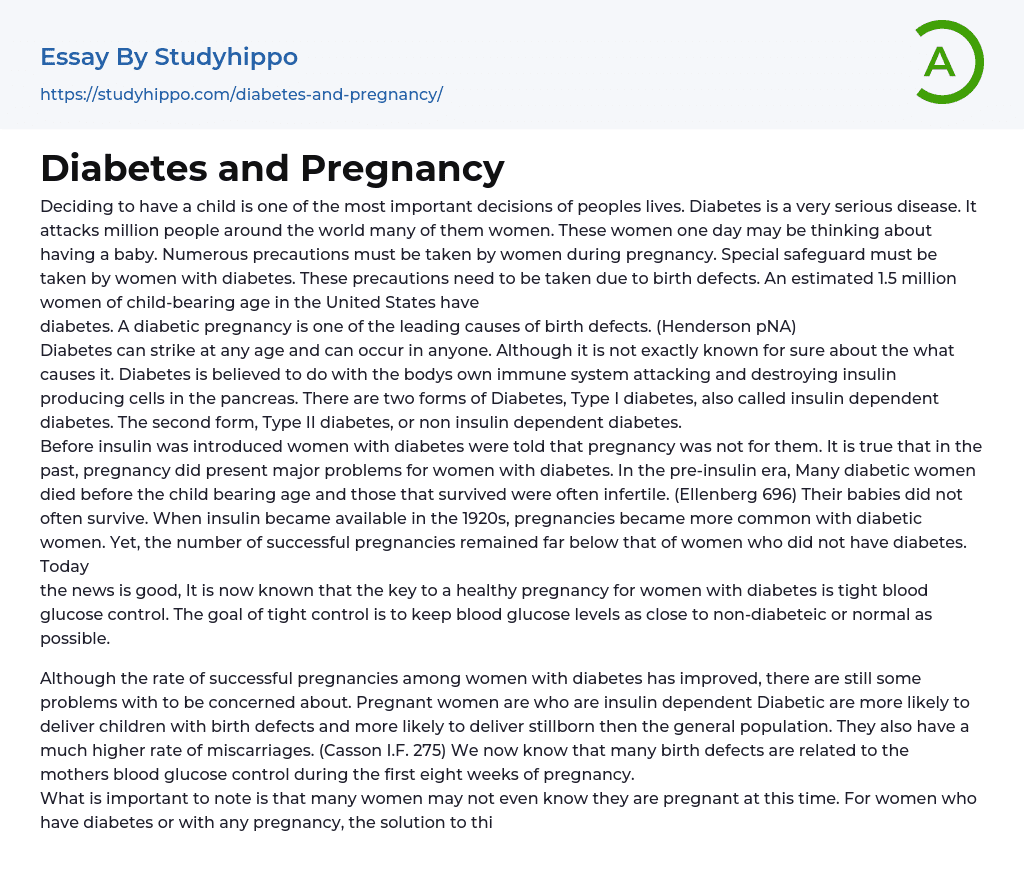Deciding to become a parent is a significant decision. Diabetes affects many individuals globally, especially women who may consider having a child in the future. Pregnant women with diabetes must take precautions to prevent birth defects.
In the United States, approximately 1.5 million women of child-bearing age have diabetes (Henderson pNA). Diabetes can occur at any age and its causes are still uncertain. It is believed to involve the immune system attacking insulin-producing cells in the pancreas. There are two types of diabetes: Type I (insulin-dependent) and Type II (non-insulin-dependent).
In the past, diabetic women were advised against pregnancy before insulin was available. They faced significant problems such as infertility issues and high mortality rates (Ellenberg 696). However, with the introduction of insulin in the 1920s, more diabetic women started having pregnancies.
Nonetheles
...s, successful pregnancies for diabetic women remain lower compared to those without diabetes. Nevertheless, there is positive news ahead.
The importance of maintaining tight control over blood glucose levels for a healthy pregnancy in diabetic women is now widely recognized. The goal of this control is to keep blood glucose levels as close to normal or those of non-diabetic individuals as possible.
Despite improvements in the success rate of pregnancies for women with diabetes, there are still significant concerns. Women who rely on insulin and have diabetes during pregnancy face a higher risk of giving birth to children with birth defects and stillbirths compared to the general population. They also have a higher rate of miscarriages (Casson I.F. 275). It is now known that many birth defects are linked to the mother's blood glucose control during the first eight weeks of pregnancy.
It is important t
note that during this critical period, many women may not even be aware they are pregnant. For diabetic women or any woman planning to get pregnant, it is essential to plan ahead. If you have diabetes and do not already prioritize good diabetes control regularly, it is time to shift your focus. Patients with existing diabetes need intensive insulin therapy before conception and throughout pregnancy. Monitoring glucose levels allows for achieving nearly normal glucose levels during pregnancy (Pasui, K. 273). Women should aim for optimal blood glucose control three to six months before deciding to become pregnant.
Good diabetes control and care have significantly reduced the chances of stillbirth, which used to be more common among women with diabetes. Additionally, babies born to women with diabetes are even more likely to experience jaundice, a common issue characterized by yellowing of the skin due to waste product buildup. Before birth, the baby needs a large supply of red blood cells; however, after birth, the baby's liver breaks down and eliminates unnecessary old red blood cells. If the baby's liver is not fully developed, it may struggle to efficiently perform this task.
The yellowing of the skin is caused by the accumulation of bilirubin, a substance derived from the breakdown of red blood cells. Instead of being expelled, bilirubin builds up in the baby's tissues. Treatment for jaundice typically involves using special lights called phototherapy to break down and eliminate bilirubin. In some cases, exchange transfusions may be needed as an alternative method (Hollingsworth, D.R. 266). However, excessively high levels of bilirubin can have harmful effects. Although rare, there are situations where a baby may require a blood transfusion.
Managing
diabetes during pregnancy requires a significant dedication of time and money for women. This involves attending extra medical appointments, undergoing specialized tests, regularly monitoring blood sugar levels, and administering more insulin injections each day. Additionally, taking additional time off from work may be necessary. Based on the woman's health condition, the obstetrician might recommend reducing working hours or ceasing work entirely towards the end of pregnancy. It is crucial for both partners to acknowledge these factors and engage in open discussions about their potential effects on finances and lifestyle.
Bibliography:
Tabarez 4
Works Cited
Books:
Ellenberg, Max M. D., et al., eds. Diabetes Mellitus: Theory and Practice. 3rd Ed., New York:Medical Examination Publishing Co., Inc. 1983
Hollingsworth, Dorothy Reycroft. Pregnancy, Diabetes, and Birth:A Management Guide. 2nd Ed., Baltimore: Williams ; Wilkins.,1992
Periodical:
Casson, I.F. Outcome of pregnancy in insulin dependent diabetic women:results of a five year population cohort study. British Medical Journal 2 Aug. 1997: p275
Pasui, Kristine Management of diabetes in pregnancy. American Family Physician June 1997: p273
Henderson, Charles W. Study Suggests Promising Treatment for Diabetic Pregnancies. Transplant Weekly 17 May 1999: pNA
- Type 2 Diabetes essays
- Hospital essays
- Physician essays
- Health Care Provider essays
- Universal Health Care essays
- Readmission essays
- Apoptosis essays
- Asthma essays
- Black Death essays
- Breast Cancer essays
- Cholesterol essays
- Chronic essays
- Chronic Pain essays
- Death essays
- Diabetes essays
- Down Syndrome essays
- Epidemic essays
- Hypertension essays
- Infection essays
- Infertility essays
- Myocardial Infarction essays
- Pain essays
- Pathogen essays
- Pregnancy essays
- Sexually Transmitted Disease essays
- Symptom essays
- Tuskegee Syphilis Experiment essays
- Water supply essays
- Addiction essays
- Anatomy and Physiology essays
- Biodegradation essays
- Cancer essays
- Dental Care essays
- Disability essays
- Disease essays
- Disorders essays
- Health Care essays
- Infectious Disease essays
- Inquiry essays
- Intelligence Quotient essays
- Lung Cancer essays
- Medicine essays
- Neurology essays
- Nutrition essays
- Olfaction essays
- Physical Exercise essays
- Public Health essays
- Sex essays
- Women's Health essays
- World health organization essays




